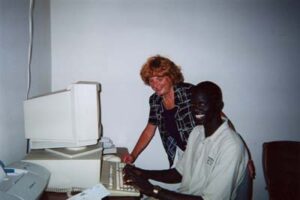Donatella Lorch
- 2002

Fellowship Title:
- Transforming Refugee Resettlement: The Politics and the People
Fellowship Year:
- 2002

The Cultural Broker in Refugee Resettlement
For Carol Russo, it all began in April 1975. Sitting in her living room, surrounded by her husband’s deer trophies and pictures of family, she watched the television news. Desperate Vietnamese trying to board overcrowded American helicopters. Thousands of refugees massed on the decks of U.S. Navy aircraft carriers. Orphans being loaded onto planes. At 37, she was a homemaker and mother of five. She lived in a two-story house, with a swimming pool in the back, on a quiet leafy street in Grand Rapids, Michigan. Her husband, Joe, a first generation Italian, ran and owned an Italian restaurant and a beauty salon. Though Carol’s grandparents were from Poland and Sweden, foreign cultures for the Russo family consisted basically only of ties to Italy. But as Saigon fell and a massive exodus of people began, she realized that she had finally found what she was meant to do. A Catholic, Russo called her local diocese and asked what they were planning to do for Vietnamese refugees. She was told that about 600 were coming to
Refugee Foster Care in Mississippi — When Cultures and People Clash
Refugee Foster Care in Mississippi — When Cultures and People Clash (Note: The names of the Sudanese youth in foster care were changed because of foster care privacy rules.) It was a simple misunderstanding. The article in the small Catholic Diocesan newsletter in Jackson, MS., welcomed the newly arrived Sudanese refugees and declared that they were “good eaters” and enjoyed their food. No doubt it was meant to point out that after more than a decade of malnutrition and even bouts of starvation, the 55 Sudanese teenagers that had just arrived there in late 2000 were enjoying the wide variety of American foods available to them. But in fact Mildred Williams, the director of the foster program at Catholic Charities in Jackson, had deeply insulted her new wards. In the Dinka and Nuer cultures of South Sudan, one never commented on the healthiness of another person’s appetite. It was synonymous with accusing them of being greedy. And if you sat and ate together, you certainly never admitted you were hungry. At first it seemed like
